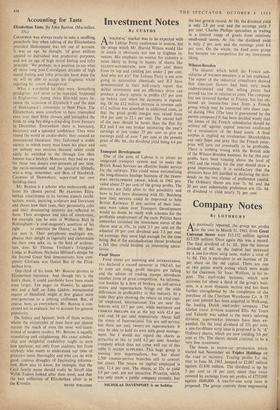Accounting for Taste
Elizabethan Taste. By John Buxton. (Macmillan, 35s.) COLERIDGE was always ready to take a snuffling, preacherly line when talking of the Elizabethans provided Shakespeare was left out of account. It was an age. he thought, 'of great abilities applied to individual and prudential purposes, and not an age of high moral feeling and lofty principle.' We perhaps, in a position to see what all those long post-Coleridgean decades of high moral feeling and lofty principle have done for us, will be able to accept his diagnosis whilst rejecting his covert disapproval: What a worderful lot they were. Something prodigious. anzi never to be repeated, happened to Englishmen during those fifty-odd years be- tween the ccession of Elizabeth 1 and the date of Shakespeare's retirement to• New Place. The Elizabethans seem somehow to have triumphed even over their filthy climate and persuaded the birds to sing hey-ding-a-ding-ding from January to December. Everywhere there is buoyancy, buoyancy and a splendid confidence. They went round the world in cockle-shells; they created an unsurpassed literature; they fashioned a stable society in which every man knew his place and yet nobody was envious, because talent could easily be switched to the through line (Ben Jonson was a bricky). Moreover, they had no use for those two dreary ever-presents of our time, the racist-nationalist and the special,st (Othello was a wog, remember, and Bess of Hardwick, Countess of Shrewsbury, supervised her owr building-sites).
Mr. Buxton is a scholar who understands and loves his chosen period. He examines Eliza- bethan creativeness in its various aspects (archi- tecture, music, painting, sculpture and literature) and shows how their taste, their personality, cults and their dominating interests are reflected in them. Their arrogance and love of ostentation, for example, can be seen in Wollaton Halt in Nottingham—`a coal-magnate's assertion of his
right . . to entertain the Queen,' as Mr. Bux- ton puts it. Their polyphonic madrigals em- phasise their delight in ingenuity and elaboration for their own sake, as, in the field of architec- ture, does Sir Thomas Tresham's Triangular Lodge at Rushton. Nicholas Hilliard's design for the Second Great Seal demonstrates how com- pletely Gloriana was Queen' Bee of the Eliza- bethan hive.
One-third of his book Mr. Buxton devotes to Elizabethan literature. And though this is the lion's share, it could justifiably have been made even larger. Ten pages on Hamlet, -as against two and a half on John Gildon, monumental mason of Hereford, might at first glance seem over-generous to a jobbing craftsman. But, of course, here, as everywhere, Mr. Buxton is con- cerned not to evaluate, but to account for general popularity.
On Sidney and Spenser, both of them writers whom the vicissitudes of taste have put almost outside the reach of even the most well-inten- tioned of modern readers, Mr. Buxton is equally stimulating and enlightening. His exact scholar- ship and delightful readability ought to earn him applause, not only from students, but from anybody who wants to understand our time of greatness more thoroughly and who can do with good, copious draughts of fascinating informa- tion. How nice to know, for example, that the Cecil family name should really be Sitsyll (the Welsh Tudors looked after their own), and that the best collection of Elizabethan silver is in










































 Previous page
Previous page